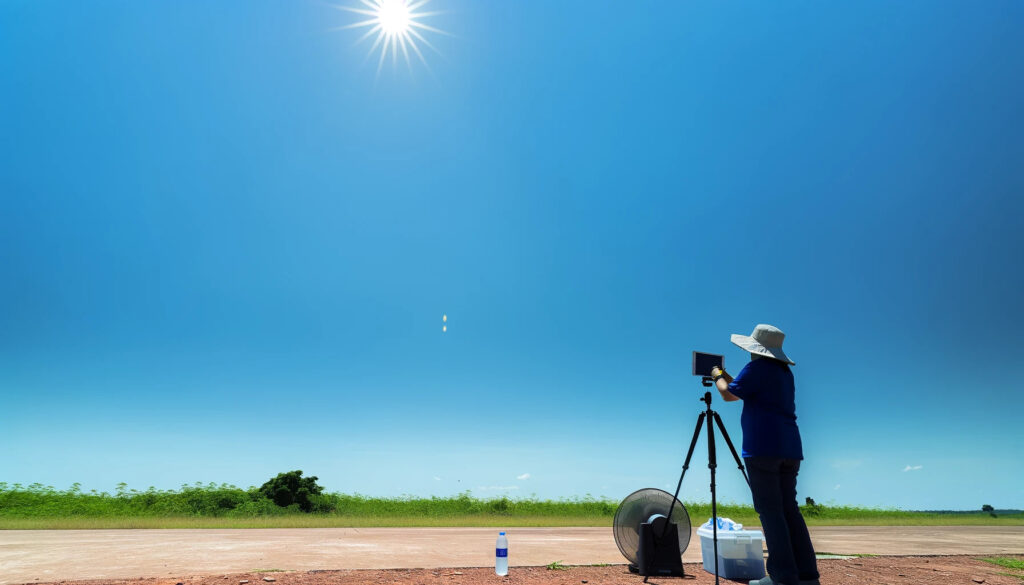Summer Filming: Tips for Handling Heat and Avoiding Overheating Devices
go.ncsu.edu/readext?1004817
en Español / em Português
El inglés es el idioma de control de esta página. En la medida en que haya algún conflicto entre la traducción al inglés y la traducción, el inglés prevalece.
Al hacer clic en el enlace de traducción se activa un servicio de traducción gratuito para convertir la página al español. Al igual que con cualquier traducción por Internet, la conversión no es sensible al contexto y puede que no traduzca el texto en su significado original. NC State Extension no garantiza la exactitud del texto traducido. Por favor, tenga en cuenta que algunas aplicaciones y/o servicios pueden no funcionar como se espera cuando se traducen.
Português
Inglês é o idioma de controle desta página. Na medida que haja algum conflito entre o texto original em Inglês e a tradução, o Inglês prevalece.
Ao clicar no link de tradução, um serviço gratuito de tradução será ativado para converter a página para o Português. Como em qualquer tradução pela internet, a conversão não é sensivel ao contexto e pode não ocorrer a tradução para o significado orginal. O serviço de Extensão da Carolina do Norte (NC State Extension) não garante a exatidão do texto traduzido. Por favor, observe que algumas funções ou serviços podem não funcionar como esperado após a tradução.
English
English is the controlling language of this page. To the extent there is any conflict between the English text and the translation, English controls.
Clicking on the translation link activates a free translation service to convert the page to Spanish. As with any Internet translation, the conversion is not context-sensitive and may not translate the text to its original meaning. NC State Extension does not guarantee the accuracy of the translated text. Please note that some applications and/or services may not function as expected when translated.
Collapse ▲ This image was generated using AI.
This image was generated using AI.
Filming in the summer can be both exciting and challenging. High temperatures not only affect the comfort of you and your talent but also your equipment. Planning and preparation are essential to ensure a smooth and successful shoot.
Summer filming brings several challenges. Prolonged exposure to high temperatures can cause iPads and other cameras to overheat, leading to shutdowns or permanent damage. Additionally, batteries tend to deplete faster in hot conditions, affecting the duration of your shoot. As we all know, summers in North Carolina can be brutal, so it’s important to avoid prolonged exposure to high temperatures.
To mitigate these challenges, consider planning your shoots during the cooler parts of the day, such as early morning or late afternoon, to avoid peak heat. How do you tell if your device is overheating or getting ready to overheat? You’ll notice some jitters inside the camera app, and performance on the iPad tends to slow down when the device is too hot. You may also notice that the device is hot to the touch, which is a major warning sign. If left unchecked, your device may automatically shut down to prevent overheating.
Here are some practical tips to help you handle the heat and avoid overheating devices during summer filming:
- If your iPad or other recording devices feel hot or start showing signs of overheating, give them a break to cool down.
- Take the iPad out of its case and placing it in the freezer for no longer than one minute can cool it down faster, getting you back out and filming sooner.
- If all you have is your car, hop in, turn the AC on full blast, and bring your iPad up to a vent. This will help it cool down faster.
- Ensure everyone stays hydrated by providing plenty of water and electrolyte drinks. Dehydration can impair concentration and performance.
- Schedule regular breaks in shaded or air-conditioned areas to prevent heat exhaustion. You can also use these breaks to cool down your equipment.
Filming in the summer requires careful planning and proactive measures to handle the heat. By following these tips, you can prevent device overheating and ensure a successful and comfortable shoot.
If you have any additional questions, please reach out!


